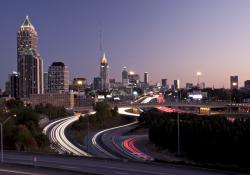
Jason Barnes, Editor of ITS International
Back in 1982, the TV series Knight Rider was first aired. KITT, the automotive half of the crime-fighting duo at its heart, was a mechanical fantasy: a car/mobile supercomputer which was impervious to pretty much any form of physical attack. I say 'supercomputer'; it/he was blessed with a memory capacity, if my Internet searches serve me well, of about a gigabyte.
That figure was arrived at, no doubt, because the show's writers couldn't ever conceive of a vehicle being capable of carrying such a fantastical amount, and yet these days you can carry several times that in your back pocket. Fantasy has become reality, and then some.
I've started with the fanciful precisely because it has a bearing on reality and current events. I'm 40 this year. I can remember computing lessons at school with hardware that had a massive 64k of RAM - in retrospect, a laughable amount. But if one looks at the length of time between now and then (about 25 years, give or take the small change) and at how long it takes to get a capital project through the planning process, built and into service, the two are roughly comparable.
More and more, I'm coming round to the idea that any project which can be prefixed with the words 'long-term' should be removed from the direct interference of government. Let's throw in bubbles, booms, busts and Moore's Law; let's compare and contrast the finessing which goes on to put the best face on things just as an electoral cycle is coming to an end with the time taken to do something really worthwhile. Okay, it's always gone on but I would argue that economically, environmentally, we've never been so close to the tipping point.
The US is far from alone in this but it will serve as an example for now. In February, the
The point is that some very necessary changes are being held to ransom by political expediency. We see procrastination for the sake of tomorrow morning's headlines.
I'd hasten to add that my comments aren't directed solely at the Obama Administration. Far from it; they're directed at the political system as a whole in countries around the world.
I started with reference to a fictional car because of its supposed technological content. Too often, developmental progress is given as the reason to adopt a wait-and-see approach. Or, to be more blunt, as an excuse for inaction. It's true that, we can't possibly know what technology will be capable of in a decade or three's time. But that shouldn't stop us putting in place long-term infrastructure projects, the utility of which should be ascertained on an apolitical basis and the pursuit of which should be ring-fenced in all senses. An injection of certainty would give us all - no pun intended - a sense of direction. It would address expectation but most of all it would mean giving projects proper financing, the support of the right legislation and business models and, perhaps most of all, time to get up enough of a head of steam to be able to work properly once bedded in.
Of course, I might just have slipped back into fantasy there...





